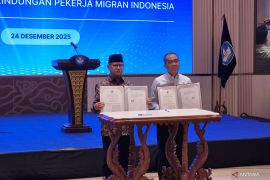Head of the Indonesian workers placement and protection agency (BNP2TKI) Moh Jumhur Hidayat made the remark at the agency`s coordinating meeting here.
He said 10,000 Indonesian migrant workers were expected to work in that East Asian country this year.
"Therefore, the government-to-government cooperation program needs to be continued and intensified," Jumhur told the meeting`s participants.
He said he was optimistic that the target could be gained because Indonesia had succeeded in sending its 12,000 workers to the country over the past years.
The South Korean economic condition had even recovered from the 2008 global crisis, he said adding that the country could even receive 2,000 Indonesian workers during the crisis.
In other part of his remarks, Jumhur also touched on the BNP2TKI`s commitment to tightening the protection of Indonesian migrant workers by improving the existing placement system.
"We are ready for running the online worker recruitment system with which the whole processes can be monitored transparently," he said.
By having such this online system, each employee candidate could be known whether he or she had participated in at least 200-hour-training or not, he said.
The protection of Indonesian migrant workers has become a crucial and sensitive issue over the past years.
In November 2010, the Indonesian people and government had been shocked by the torture of Sumiati binti Salan Mustafa by her Saudi Arabian employer.
Besides the case of this 24-year-old female worker, there were four other Indonesian workers who had badly been treated in Malaysia.
Rieke Diah Pitaloka, member of the House of Representatives` (DPR) Commission IX overseeing manpower, called on the government not to ignore violence cases that Indonesian migrant workers still faced.
Among the cases that the Indonesian government needs to pay serious attention to were the ones that Siti Hajar and three other Indonesian workers in Malaysia had undergone, she said.
Siti Hajar was the victim of her employer`s brutality but Michel, her Malaysian employer, remained free after appealing to the country`s higher court for her eight-year-in-jail punishment.
Three other Indonesian workers were also shot dead by the Malaysian police last March.
"Don`t let new violence cases happen but old cases should neither be ignored," said the legislator of the Indonesian Democratic Party-Struggle (PDIP) faction at a press briefing last year.
Saudi Arabia currently employs 927,500 Indonesian migrant workers, making it the second biggest user of Indonesian manpower after Malaysia.(*)
Editor: Aditia Maruli Radja
Copyright © ANTARA 2011











